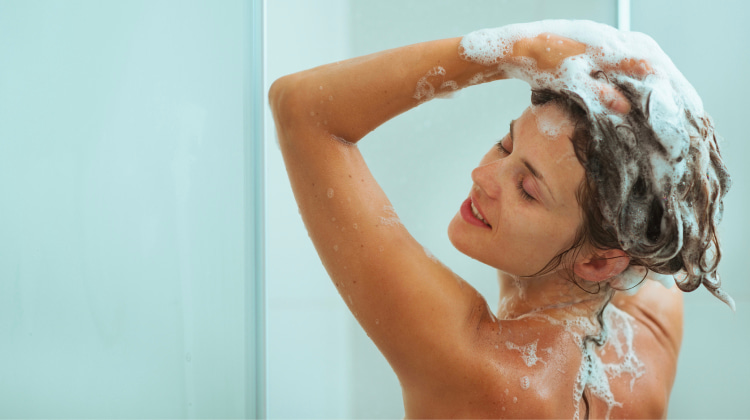
Whether you’re suddenly out of body wash or just trying to save money, you may have thought to substitute it with shampoo. Shampoo and body wash both create lather and smell the same, and sometimes their bottles even look the same. Yet there might be hidden differences in the makeup of these two types of cleansers that stop them from being interchangeable.
This article will delve into the similarities and differences between these two products and give a conclusive answer on whether or not you can use shampoo in place of body wash.
Can I Use Shampoo as Body Wash?
Yes, but you shouldn’t. While shampoo and body wash may share many similarities as they’re both primarily made up of water, detergent, and conditioning ingredients that make the detergent gentler, they are still made for different purposes.
Shampoo and body wash specialize in cleaning different parts of the body and using them in unintended ways will always be less effective. As your skin is more sensitive than your hair, shampoo often contains more abrasive ingredients that might cause your skin discomfort in various ways.
Potential Side Effects of Using Shampoo for Body Wash
Here are some of the potential side effects you should be aware of before using shampoo as a body wash.
Leave Your Skin Feeling Slick
Shampoo may contain high levels of oils and conditioning agents, which are necessary for keeping hair healthy and shiny but may not be effective in removing all the dirt and excess oils from your skin. If you use shampoo on your body, you may find that it leaves your skin feeling slick, rather than clean and refreshed.
Even shampoos formulated for dry hair may contain additional oils that can make your skin feel slimy and sticky. This is in contrast to body wash, which is formulated with higher levels of surface-active agents(1) to cleanse the skin effectively without leaving it feeling oily or slick.

Leave Your Skin Unclean
When it comes to cleansing your skin, body wash is the superior option. Shampoo, on the other hand, is designed specifically to clean and condition hair, not skin. Shampoo has a lower concentration of surfactants compared to body wash, as it's not meant to strip away all the oils from hair follicles.
This means it may not effectively remove dirt, oils, and odors from your skin, and the conditioning agents may leave your skin feeling greasy instead of clean. You may require double cleansing to achieve the same level of cleanliness as with an actual body wash.
Leave Your Skin Dry
Using shampoo as a body wash can leave your skin dry and dull. Shampoos are formulated with an acidic pH to maintain the hair's cuticles smooth, while body washes have a slightly lower pH to keep the skin soft and smooth. The pH difference between shampoo and body wash means that lathering shampoo may cause your skin to become super dry to the point of peeling or to react with acne or even eczema.
Furthermore, shampoo often contains surfactants, cleansing ingredients(2) that remove oil and dirt from your hair but can also strip away natural oils that keep your skin healthy. If you have dry skin, using shampoo as a body wash can leave your skin feeling tight, itchy, and even flaky.
Irritate Your Skin
Shampoo as a body wash uncommonly causes rashes or swelling. If you notice that your skin appears somewhat red after using shampoo as body wash, this could be a sign of irritation caused by the shampoo.
Typically, such irritation is more common in sensitive areas like the face and private parts where the skin is more sensitive to chemicals. Washing your private parts with shampoo can be especially problematic and may result in burning, itching, or even a full-blown infection.
Moreover, shampoo usually contains fragrances and essential oils that can irritate your skin, especially if you have sensitive skin, leading to redness, itching, and rashes.
Alternatives to Body Wash
While shampoo may not be a good substitute for body wash, there are many excellent alternatives just as effective at keeping your skin clean and healthy.
Soap

Soaps have been around for a long time and are an excellent option for washing your body, using fewer ingredients than shampoo, and causing fewer skin issues. Soap bars are more convenient to own and last longer than body washes.
To get the best results, it is recommended to use organic soaps with essential oils instead of synthetic fragrances, especially for kids. Premium bar soaps made from organic products and high-grade laboratory products, and those that do not contain Sodium Lauryl Sulphates, are the best alternatives to body wash.
Shower Oil

A relatively new but powerful product with many benefits for the skin, shower oils can be a great alternative to regular body washes. They can be infused with various scents like lavender, lemon, and rosemary.
To use, apply the oil all over your body before stepping into the shower. Once it comes into contact with water, it becomes thick like milk, providing a soothing impact. Shower oils are particularly useful for sensitive skin and can also treat viral and bacterial infections, as well as dry and itchy skin.
Body Scrub

Unlike body wash, body scrubs are made of coarse particles suspended in an oil base, giving them a rough texture. The rough texture of the scrub increases blood flow, exfoliates the skin, promotes regrowth, and can even eliminate ingrown hairs.
Body scrubs come in many different scents and colors, so you have lots of options to choose from. While body scrubs clean your body better than body wash, it’s not recommended to replace your body wash with body scrubs indefinitely. Instead, use them as a supplement to your regular body wash routine.
Reetha

Reetha, also known as Indian soapberry or soapnut, is a natural hair cleanser that can be found in local Ayurveda stores or Indian/Pakistani stores.
Soapberry is a real fruit that can produce a soap-like lather when crushed, boiled, and de-seeded. This natural fruit produces a substantial amount of lather, making it a fantastic skin cleanser that has a safe pH level for your skin. Soapberry is an excellent choice for cleaning your skin naturally.
To use it, remove the seeds from 20-25 berries and place the berries in a saucepan with 200 ml of water. Boil the mixture until the water is reduced to half its original amount, then squash the berries and strain the water. The resulting liquid can be used as a shampoo substitute to cleanse your hair. With natural ingredients, reetha is a great alternative to traditional shampoos.
The Bottom Line
In conclusion, while shampoo and body wash may seem similar, they are not interchangeable. Shampoo is formulated for hair and contains more abrasive ingredients that can harm the skin when used as body wash.
Alternatives exist which are formulated specifically for the skin and can help maintain healthy skin. Using the appropriate product can prevent adverse effects and leave your skin feeling clean and refreshed.
Frequently Asked Questions
What happens if you use body wash as shampoo?
It is best to avoid using body wash on your hair because it can strip the natural oils and cause dryness and irritation due to its alkaline pH(3). However, using body wash on your hair occasionally won't cause any harm, and using conditioner after rinsing can help prevent dryness.
Is it ok to use shampoo as body wash?
You should avoid using shampoo as body wash for it may cause various side effects, but it’s fine if you only wash your body with shampoo once in a while.
Can you use baby shampoo as body wash for adults?
Yes, baby shampoo is much more gentle on the skin but it’s still not as effective as actual body wash.
Can shampoo cause back acne?
Yes, when people shampoo or condition their hair, these substances run down the neck and back, clogging pores and causing neck and back acne breakouts if not thoroughly washed away.
References
1. Seweryn, A. (2018). Interactions between surfactants and the skin – Theory and practice. Advances in Colloid and Interface Science, {online} 256, pp.242–255. doi:https://doi.org/10.1016/j.cis.2018.04.002.
2. Rathi, S. and D′Souza, P. (2015). Shampoo and conditioners: What a dermatologist should know? Indian Journal of Dermatology, {online} 60(3), p.248. doi:https://doi.org/10.4103/0019-5154.156355.
3. Gavazzoni Dias, M.F., Pichler, J., Adriano, A., Cecato, P. and de Almeida, A. (2014). The shampoo pH can affect the hair: Myth or Reality? International Journal of Trichology, {online} 6(3), p.95. doi:https://doi.org/10.4103/0974-7753.139078.

.jpg)
.jpg)
.jpg)
.jpg)
.jpg)
.jpg)
.jpg)
.jpg)
.jpg)
.jpg)